- Home
- Kim Newman
The Night Mayor Page 9
The Night Mayor Read online
Page 9
We walked a couple of blocks, looking in vain for a cab. Carradine struck me somehow as unusual, even for the City. He was spilling over, out of his stereotype, confused about his role.
‘I’ve got things in my head that came from nowhere,’ he said, ‘things that don’t make sense to me. Clues, I guess you’d call them.’
‘Clues? Like what?’
‘The World Tree,’ he muttered, ‘something about the World Tree, Richie. No, that’s not it. Damn it, but it’ll come to me in a moment. I’m sure it will.’
‘Yggdrasil,’ I said, ‘the World Tree.’
‘That’s it. Yggdrasil. Queer sort of a word, isn’t it?’
I remembered Yggdrasil. The wooden fist of Viking legend, wrapped around the world, extending its branches everywhere. Only my Yggdrasil wasn’t wood, but something else alive. In my mind, I had a crazed vision of a composite creature, with iceboxes and radiograms and vacuum cleaners and electric chairs and telephone exchanges for nerve endings, trucks and aircraft and cranes and streamlined trains for limbs, and perhaps a Bomb for a brain.
‘It has something to do with Daine, and the way he ran the City. It’s not much to go on, but it’s a start.’
I knew where to go now. I started steering Carradine, rather than him supporting me. He hesitated, but followed my lead. I guessed he wanted the answers too.
‘We’ll have to find out who Daine’s heir is. Or maybe it’s not an heir, exactly. Maybe we’re after his ghost.’
‘What do you mean?’
‘I don’t know. I saw him dead. There’s no doubt about that. And things have changed since he got remaindered, but I’ve got this feeling – call it a detective’s intuition – that he left something of himself behind. The City’s still his in some way, held in trust.’
It was in a sleazy neighbourhood, but then again so were most places in the City. We approached it cautiously, in case the cops had it staked out. I had Carradine walk up and down the street several times, acting suspiciously. Nobody came for him. He stood on the steps outside the building, tattered cloak flapping like a scarecrow’s nightshirt, and signalled to me.
Then we went up to my office to do some serious detective work.
12
In my office, Carradine cat-napped, snoring vigorously, hammocked between two chairs. The irritating neon sign outside the window strobed the room, broken Venetian blinds breaking the light into bright bars. I had the radio on low, in case they interrupted the broadcast with any bulletins that might lead me to the new Night Mayor. Meanwhile, I went through my files.
I call it an office, but it’s also an apartment. I was sure I lived there, but I couldn’t remember if there was a bedroom attached. If there was, I couldn’t find it now. There were plenty of filing cabinets, with half-full bottles, and an empty water cooler that I evidently kept as an excuse to have a tower of paper cups. While Carradine slept, I tried to take away the taste of defeat and Kelly’s coffee with a shot or fourteen. It was supposed to be good whisky, but the thin layer of dust in the bottom of all the cups didn’t improve the taste any. Daine’s booze had tasted like sugared water, mine was like sugared water with added grit. I licked my teeth, and started digging.
At some earlier, more enthusiastic, stage in my career as a detective I had compiled dossiers on everyone of any importance in the City. Cotten of the Inquirer must have helped me out, because every file was complete with news clippings and candid photographs. Those friends on the police force who would doubtless fail to remember me these nights had even let me have carbons of a few rap sheets. I considered calling up one of contacts and declaring my innocence, but decided against it. Until I had myself out of the frame, it wasn’t a good idea to drag anyone into the case who wasn’t there already. Besides, I had had time to pick up the late edition. PRIVATE EYE SOUGHT IN DAINE SLAYING was the headline, and Cotten’s byline was over the story. The way he wrote it, I guessed he was as sure as anyone that I had been the trigger man. All my friends would be busy with their ink erasers trying to scrub me out of their address books. Especially my cop friends.
I trusted Carradine because he was different, but trusting him led to mistrusting everyone else. ‘It’s like being a reverse zombie,’ he said, ‘I’m alive, but everybody else is dead.’ Enough people were after me. The fewer who knew where I was, the better.
Someone had been at the office, of course. The door had been kicked in, and the chaos rearranged. They hadn’t found anything, and had gone back to their usual haunts. Cops or hoods, it didn’t matter. They had probably both paid a visit. And they’d call again later, which was why I was working by a single-bulb desk lamp, quickskimming the liquid and document overflow from my filing cabinets. The frosted glass panel with my name on it had been cracked, but that could have happened at any time.
I pulled the Daine file first. It was the thickest. There he was in all his splendour, gazing blithely out of society-column illustrations, going into or coming out of some swank nightspot or other, with a gorgeous girl on either arm. Socialite Lyn Bari, nightclub chanteuse Lizabeth Scott, ecdysiast Rita Hayworth, fiery senorita Dolores Del Rio: they had all been names in his little black book. No wonder he looked so smug in most of his photographs. Recently, his ‘constant companion’ had been Rhonda Fleming. In one shot, Daine could be seen in the background while Rhonda was trying to scratch out the eyes of a competitor for his attentions, Arlene Dahl. The headline was CAT FIGHT CUTIES! Wealth, power, dames: Daine couldn’t have Dreamed up a better situation for himself in the City if he had been trying.
Most of the clippings were boring stories about charity functions, civic balls, philanthropic gestures, patriotic speeches or War Bond drives. There were endless party guest lists, with Daine’s name – and certain others – circled. There were even inventories of his collection, with fabulous sums paid for a succession of sculptures, paintings, original scores and manuscripts or items of historical interest. In one picture, Daine was showing off his most prized trophies – the longbow with which Errol Flynn had driven the Normans out of Sherwood Forest, Leslie Howard’s Ku Klux Klan hood and the original telephone invented by Don Ameche. There were gossip-column items, too, about such-and-such an amusing practical joke played on William Powell or this-and-that fancy present given to Carole Lombard. All very innocuous stuff. I had underlined the few shady connections which made it into the open.
Daine’s closest pals were Claude Rains, the radio criminologist, and Otto Kruger, who was some sort of phony-baloney mystic. They were part of the Cicero Club, a society which met once a month or so to discuss famous unsolved mysteries. I had made notations by the Cicero Club stories. There must be something spicy in that combination: Daine could have solved at least three quarters of the crimes in the City just by owning up. And in their own dossiers, I found a few suggestive hints to the effect that Rains and Kruger were hardly spotless. Nothing overt, of course, but a few too many underworld contacts, a few too many mysterious bequests. Rains and Daine had owned a piece of Kirk Douglas, a promising young heavyweight whose career had been ended by a ‘cerebral haemorrhage’ in the ring, just in time for Kruger and a few others to collect a parcel by betting against him. And who was the bruiser who gave Kirk the big headache? Our old friend Mike Mazurki. When Daine had first come to the City, he had – I knew for a fact – taken over a large proportion of the vice business that had been run by Paul Muni, a mobster whose empire had fallen thanks mainly to the investigative efforts and single-mindedness of – you guessed it – criminologist Claude Rains. I had been trying to get a membership list for the Cicero Club, but the only other name I could come up with was George Macready, a scarfaced iceman who had a profitable share of the City’s gambling and was best known for his sword-extruding walking stick. Nice people.
There were other possibles – mostly underworld figures – but I discounted them as red herrings. Sydney Greenstreet was too old to be taking much of an interest, and had in any case become obsessed with some obscure quest of his own, neglecti
ng his ‘business’. Whoever the new man at the top was l would have staked plenty that his first move would be to squeeze Sydney out and add his former holdings to the pot. A chubby young man called Laird Cregar appealed to me as a suspect, if only because he had the habit of being seen loitering around places where beautiful women had just been strangled. But his plump face and crazed eyes suggested he was merely a psychotic. A more refined psycho than, say, Lee Marvin or Neville Brand, but a crazy’s still a crazy and I didn’t think someone that far gone could take up where Daine had left off. Cregar might lounge in silk pajamas and stuff himself with Parisian chocolates, but he was still a supporting heavy, a cringing underling who’d never last at the top of the criminal tree. George Sanders was out of the running now, having been hauled in as an enemy spy, but I’d be interested in knowing who precisely had tipped the Feds off to his brokerage for state secrets in the suburbs. Orson Welles was too busy with his radio show, Bela Lugosi could never get any master plan together beyond his next insane experiment, Vincent Price wouldn’t rank with the major bad guys until horror pictures caught on again, and Zachary Scott’s thin moustache betrayed his lack of substance as a mastermind.
My best bets were still Rains and Kruger. One, or both, of them could easily have opted to give Daine a hot lead push and taken the operation over. Or maybe it was more complicated than that. Maybe Daine had somehow cooperated in his own extermination, but transferred something of himself to his heir. In Otto Kruger’s file, there were a bunch of crackpot pieces on various psychic phenomena – hypnotism, mental telepathy, oneiromancy, possession. Maybe Daine had gone dybbuk and passed into another body. Metempsychosis, that was called. It was screwy, but so was everything else in this case. I had the feeling I had been given most of the pieces, but not the boxfront picture to tell me how to put them together.
I looked at some pictures of Rhonda Fleming. She favoured very tight gowns with large pieces cut out of them. There had to be a woman in the picture. With me, there invariably was. I took my automatic out and rested its cold metal on Rhonda’s paper torso. She was some kind of a woman all right. Cute as lace pants, sharp as a stiletto and hungry as a Bengal tiger. I hoped we’d get to meet some time soon.
‘We interrupt this broadcast,’ said an announcer, fading out José Iturbi, ‘to bring you an important newsflash…’
The urgent tones startled Carradine awake, and with a cry, he fell off his chairs. The furniture tangled in his long legs.
‘…Captain of Detectives Barton MacLane has called out the National Guard to assist in the search for private detective Richard Quick, who is still at liberty. Quick is wanted in connection with the brutal murder earlier this evening of millionaire philanthropist Truro…’
I turned off the radio, wrenching the knob off the set. It was the same old guff. I had heard it all before.
‘Perhaps you’d better get out of the City,’ suggested Carradine.
‘Perhaps there isn’t an outside to go to.’
‘Sure there is.’ He smiled. ‘I remember the prairies. Why, I remember being in a stagecoach, with the Apaches attacking, and out on the road with Henry Fonda and the Okies and shooting Tyrone Power while he was hanging up a picture…’
‘Are you sure, John?’ I knew how memories like that worked. Right now, in the familiar clutter of my office, I had this feeling in my water that I had never been in the room before. Someone’s hand had torn away three-quarters of the days of the desktop calendar and filled a wastebasket with them, and someone had written girls’ names and telephone numbers on the blotters. I recognised my own handwriting and the way I would scrunch up a calendar date before throwing it away. But I couldn’t see myself actually scribbling or tearing. That had been someone else. Maybe it was me. Maybe I was the ghost. ‘Are you sure?’
Carradine’s eyes saw faraway sights, and he ran a hand through his shoulder-length hair. ‘No, now you come to mention it, I’m not. Those things happened, I know that, and I could swear they happened to me. But maybe in other lives, or in…’
I lit a cigarette. ‘…In Dreams, John, Dreams. There are too many maybes in the City, too many dreams within Dreams. You were asleep just now; were you dreaming?’
‘Yes, I…’
He looked scared for a moment; then almost scary, stroking his moustache with long, thin fingers, thoughtfully tonguing sharp teeth.
I exhaled a cloud of smoke. The neon striped it in the air. ‘What were you dreaming?’
‘I’m not certain. I was dead, but alive. I was wearing evening clothes like a dress extra, and I had flour in my hair. It was somewhere in Eastern Europe, I think. The men wore lederhosen and the women gypsy blouses. It was modern times, but there was no war. And I was thirsty… it’s difficult to say, I wanted… to… drink… blood.’
The tall man was racked with self-disgust. I couldn’t help but feel for him. ‘Don’t worry, John, it’s just a dream. Just another role seeping through.’
‘Ugh. It was repulsive. Were there any clues in your files?’
I riffled the papers on the desk. ‘Just names. Claude Rains, Otto Kruger, George Macready. They were tied in with Daine, maybe still are…’
Under the files, the telephone rang. Carradine and I looked at each other. The ringing was startlingly loud. I knew that if there was anyone else at all in the building, they’d be alerted to it. It grated on my eardrums, set my teeth on edge, shook loose all the pains I thought I had lost.
‘They’ll give up,’ I said. We stood hunched over the desk, frozen like waxworks. The telephone rang twenty, forty, a hundred times, and kept on ringing. It got louder, more painful. I saw a bead of sweat drip from Carradine’s forehead, trickle down his cheek, perch on the end of his moustache and fall with a small splash onto a picture of Rhonda Fleming posing in a backless, strapless, practically frontless dress. ‘They can’t possibly expect an answer.’
Carradine was shaking, holding onto my desk with both hands to keep steady. I followed the telephone cord and found where it went into the wall. One tug and the noise would go away. But whoever was calling would know someone was here. Perhaps the cops had a man calling up every half hour, and a squad car ready to be here in seconds. They had let me slip through the net earlier; they wouldn’t exactly be fans of mine. And the National Guard were on the case now. They’d have much bigger guns than me, and be authorised to use them. I put my hands over my ears and prayed that the ringing would stop. Everything in the office was vibrating. I knew how the Hunchback of Notre Dame had gone deaf, with the tinnitus for ever in his head.
With a strangled, gargling shriek, Carradine fell over, frothing at the mouth, arms waving. A pile of documents, clippings and photographs fell with him and drifted around him as he writhed on the floor. The ringing stopped, and I gave a silent thanks to St Bernadette of Lourdes for the miracle. Then I realised Carradine had knocked the phone off the hook when he fell, and that the receiver was dangling under the desk…
‘Tunney,’ said a female voice, tiny but shouting, ‘Tunney, pick up the damned phone if you’re there. We need to talk. Tunney…’
Almost laughing, I took the receiver. ‘Hello,’ I said.
‘Tunney. Yggdrasil be praised. Listen, I’m at the bus station. You need help. My name is Susan. Susan Bishopric. We’ve met. We lobbied the British Board of Dream Classification over the blasphemy rulings. I Dreamed The Parking Lottery.’
‘I’m sorry, lady,’ I said, ‘but you must have the wrong number. My name isn’t Tunney.’
I hung up, and went to help Carradine. He had stopped twitching violently, but he wasn’t out of his petit mal yet. His limbs were working independently of each other.
‘Snap out of it,’ I said, flicking him lightly about the cheeks with my fingers, ‘we’ve got to get out of here. That might not have been a wrong number. Somebody could have put the finger on us.’
He wiped the froth from his lips with a huge handkerchief, and apologised for his behaviour. ‘I don’t know what got into
me. It was the telephone. It didn’t sound… natural.’
‘I know what you mean. But I’m not sure there’s any nature at all in this case.’
* * *
Outside my office window, the irritating neon sign flashed on and off, casting rigid bars of light into the room. Prison bars.
13
‘Where to, lady?’ asked the cab driver. Susan recognised the desperate whine in his voice, but read the name off his licence anyway. Elisha Cook Jr, professional loser, fall guy and victim. Cook had the face of a shrunken Peter Pan, lost in adulthood.
‘Cruise,’ said Susan. ‘I just want to get out of the rain.’
‘It’s your dough, sister.’ Cook manhandled the meter flag. It ran like a click-click-clack off the beaten track as the Brownsville Train comes through, like the tick-tack-toe of Old Black Joe…
Susan snapped, ‘I ain’t your sister, bud!’ Was that correct? Ain’t? Bud?
‘Pardon me for livin’, lady.’
‘One of these days, if you work at it real hard.’
‘Say –’ Cook’s worn veneer of toughness dissolved – ‘quit ridin’ me. I ain’t hostile.’
‘Sorry. It’s late.’ She had miscalculated: she thought everyone in the City insulted each other. ‘I’ve had a rough evening.’
‘Me too. I been beaten up by hoods, framed on a murder rap, beaten up by cops, sent up the river, beaten up by prison bulls, got a last-minute reprieve from the governor, and been beaten up by my girl.’
‘Sounds tough.’
‘In spades, lady.’
Yeah: in spades, on ice, eight ways to sundown, from here to eternity. It was a different language. An idiot Dream if ever there was. She knew she mustn’t give in to it. There was a risk of ending up like Tunney. On the phone, he had sounded in a bad way. She had called him up from the bus station as soon as she got into the City. It had been ridiculously easy to track him down. Richard Quick, Private Enquiry Agent, was in the Yellow Pages under Detectives. Humphrey Bogart, Dick Powell and Alan Ladd had big display adverts with prominent slogans: ‘No Divorce Work’, ‘Trouble Is My Business’, ‘This Gun for Hire’. Quick was buried in a column of single-line ads for grade-B bloodhounds, between Dick Purcell and Ron Randell. His irresistible come-on was ‘Investigations – Cheap!’

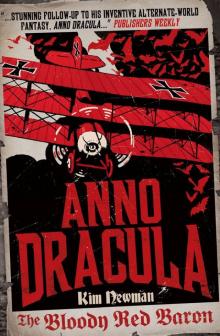 The Bloody Red Baron
The Bloody Red Baron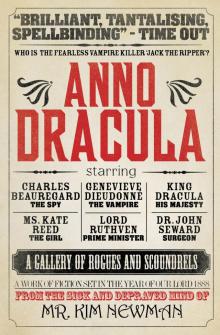 Anno Dracula
Anno Dracula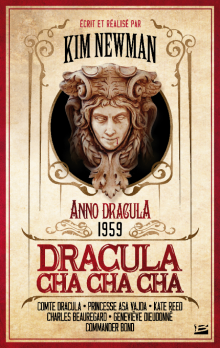 Dracula Cha Cha Cha
Dracula Cha Cha Cha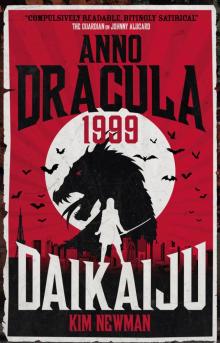 Anno Dracula 1999
Anno Dracula 1999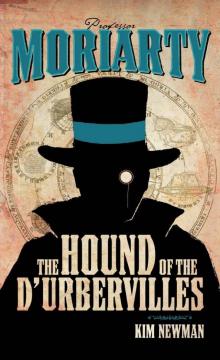 Moriarty: The Hound of the D'Urbervilles
Moriarty: The Hound of the D'Urbervilles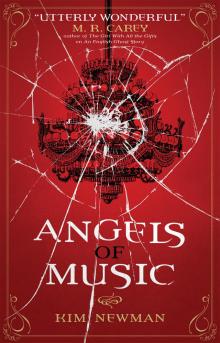 Angels of Music
Angels of Music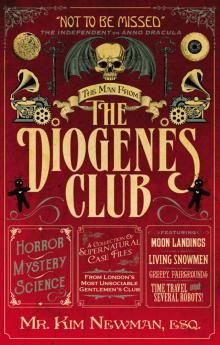 The Man From the Diogenes Club
The Man From the Diogenes Club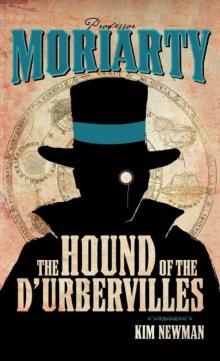 Professor Moriarty: The Hound Of The D’urbervilles
Professor Moriarty: The Hound Of The D’urbervilles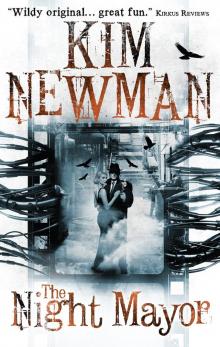 The Night Mayor
The Night Mayor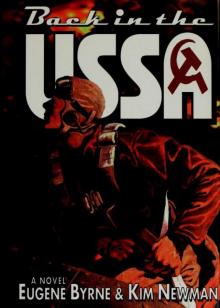 Back in the USSA
Back in the USSA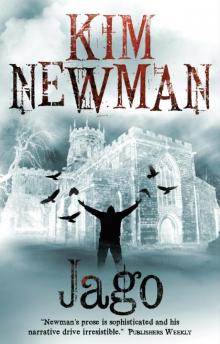 Jago
Jago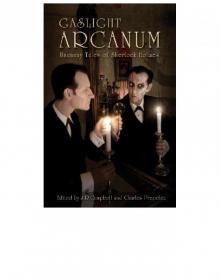 Gaslight Arcanum: Uncanny Tales of Sherlock Holmes
Gaslight Arcanum: Uncanny Tales of Sherlock Holmes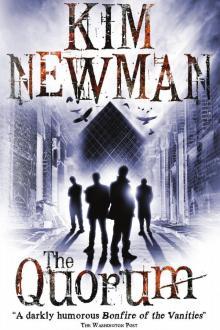 The Quorum
The Quorum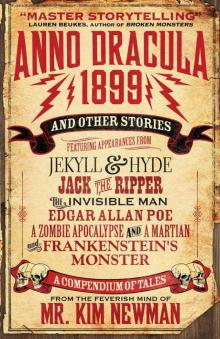 Anno Dracula 1899 and Other Stories
Anno Dracula 1899 and Other Stories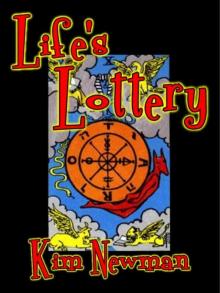 Life's Lottery
Life's Lottery The Secrets of Drearcliff Grange School
The Secrets of Drearcliff Grange School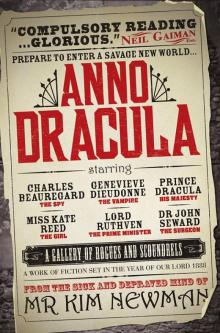 Anno Dracula ad-1
Anno Dracula ad-1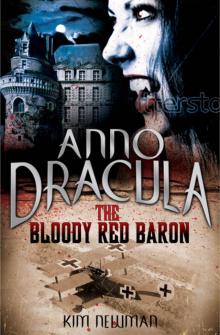 The Bloody Red Baron: 1918 ad-2
The Bloody Red Baron: 1918 ad-2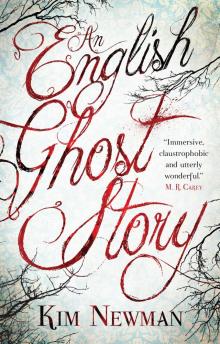 An English Ghost Story
An English Ghost Story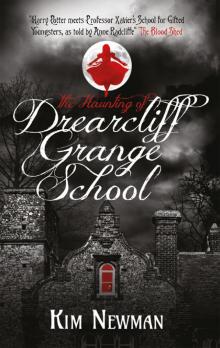 The Haunting of Drearcliff Grange School
The Haunting of Drearcliff Grange School The Other Side of Midnight
The Other Side of Midnight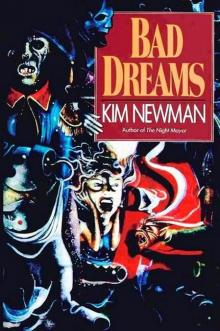 Bad Dreams
Bad Dreams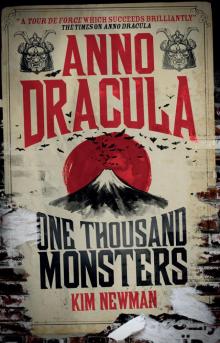 Anno Dracula--One Thousand Monsters
Anno Dracula--One Thousand Monsters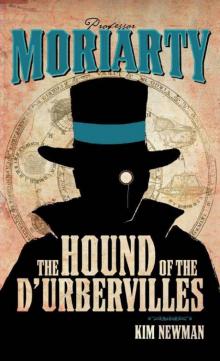 The Hound Of The D’urbervilles
The Hound Of The D’urbervilles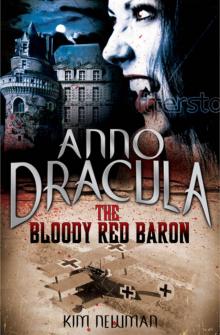 The Bloody Red Baron: Anno Dracula 1918
The Bloody Red Baron: Anno Dracula 1918